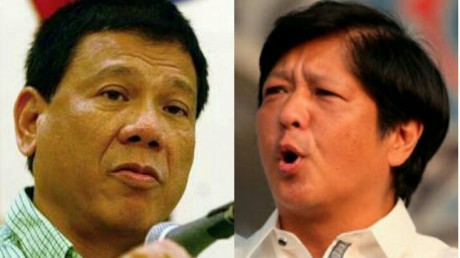
The standout theme of this year’s presidential elections is finally taking shape and crystallising before our eys. The vote is being shaped by a growing view that the status quo is no longer to be tolerated. The Yellow brand of the Aquino-Cojuangco-Roxas clans has long ago lost their “revolutionary” laban persona and have, over the last 30-years, come to be associated more with the new post-1986 status quo. Worse, it is a status quo that has been deemed utterly dysfunctional and an absolute failure.
In short, Filipinos have concluded that this status quo sucks and that it is time to vote for real change. This is a vote for innovation led by an intelligent electorate and pushed forward by tech-savvy and trendy “millenials”. This newly-gentrified and thoroughly-modernised Philippine electorate is what is now propelling two much-maligned (by traditional Yellow status quostalwarts) politicians — former Davao City Mayor Rodrigo Duterte and Senator Bongbong Marcos to the top of the polls. The change they represent is not revolutionary in the same way that the Liberal Party (LP) camp of current President Benigno Simeon ‘BS’ Aquino III and its candidate Mar Roxas had pitched itself over the last 30 years since the 1986 EDSA “revolution”. Rather, it is transformational within the framework of institutional democracy.
In short, the transition from Yellow rule to the innovative rule of a Duterte-Marcos government that this election will see is Philippine democracy finally working as it was meant to work — a vote on the back of the strength ofvision truly originated and supported from the bottom up.
ABS-CBN News columnist Inday Espina-Varona handily summed up what is underlying Duterte’s success in her recent article Poe in trouble; Duterte with the right moves…
He’s not courting people; they’re choosing him as the candidate who, rightly or wrongly, represents their needs and demands.
This is the best and most stable sort of vote. Duterte is a candidate who is sought by voters rather than sold to them. As Espina-Varona rightly observes, Duterte is not regarded as “the lesser evil”. His supporters see him as a superior candidate in absolute terms. More importantly they are an evolving support base…
True believers are Duterte’s real weapons. They won’t stand back just because you disagree with their choice. They will engage you, they will argue – they’re better behaved these days – they will earnestly sell their candidate. They are also more creative in meme-making. They will record, post and share everything Duterte says, in the best possible light.
In much the same way that Duterte pulled in supporters to his cause (rather than pushed himself to them), Senator Marcos has endeared himself to his massive and still-rapidly-growing opt-in voter base by delivering performance. Marcos exhibited exemplary leadership and statesmanship over the course of various crises that rocked the Philippines over the last several years. Most noteworthy is his role in leading the country out of the abyss of demoralisation and denial following the massacre of 44 Special Action Force troops that was the tragic outcome of a botched covert operation engineered by the Aquino government.
Stepping back to regard the bigger implications of that crisis, Marcos had saved the Philippines from the clutches of the Bangsamoro Basic Law (in the current form President Benigno Simeon ‘BS’ Aquino III and his minions railroaded through the House of Representatives). He has, in the process, demonstrated an ironic allegiance to the Philippine Constitution — a national charter that was crafted under the watch of no less than President BS Aquino’s mother, former President Corazon ‘Cory’ Aquino.
As chief Senate reviewer of the proposed BBL, the junior Marcos exhibited the sort of statesmanship and diplomacy that the original Malacanang negotiating team led by Secretary Teresita Quintos-Deles and Miriam Coronel-Ferrer utterly lacked. Over the course of the review, Senator Marcos tirelessly travelled all over the country to consult with everyone potentially affected by the proposed law that would have seen a vast chunk of Mindanao ceded unto the hands of the terrorist Moro Islamic Liberation Front.
The ability of both Duterte and Marcos to unite Filipinos from the Babuyan Islands down to South Cotabato is unprecedented — or, at least, not something seen over the last three decades of post-1986 “freedom”. The confident terseness of Duterte’s presence in the last episode (Round 2) of the series of COMELEC-sanctioned televised debates contrasted sharply with the traditional all-talk-no-action (A.T.N.A.) noise contributed by his fellow candidates in that exercise. Round 2 of #PilipinasDebates2016 served him well by giving him the opportunity to exhibit his exceptional skill at conflict resolution (where the others were more a sad showcase of conflict creation).
Indeed, conflict resolution acumen (exhibited by the bucket loads in recent days and over the larger careers of these men) is what seems to be the common denominator that could make a Duterte-Marcos tandem really work. They have their work cut out for them. Conflict is more the rule than the exception in a country long desperate for the smallest measure of unity and coherence.

No comments:
Post a Comment